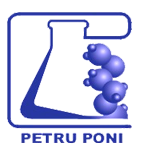The goal of this project is to determine feasibility and efficacy of some remediation methods for
polluted forest soils in Tarnita (Crucea) area, based on polymers with high affinity toward heavy
metals. Risk assessments at Tarnita site reveal that metal contamination is the greatest risk to
human and forest health. The mining activity led to the contamination of surface and
underground waters, being one of the most important ecological disasters in Romania with a
major and continuous impact on the local community.
The tailing ponds constitute also major factors of pollution of the environment. The
ecological rehabilitation measures undertaken so far in order to mitigate the effects of mining
activities cover just a small part of the affected environment and are not necessarily
economically efficient. Moreover, chemical, microbial, macromycetes- or yeast-based bioremediation, as well as the sorption on zeolits were less successful. A consortium of four
partners, which clearly demonstrates deep expertise in the field with published results has been
established.





